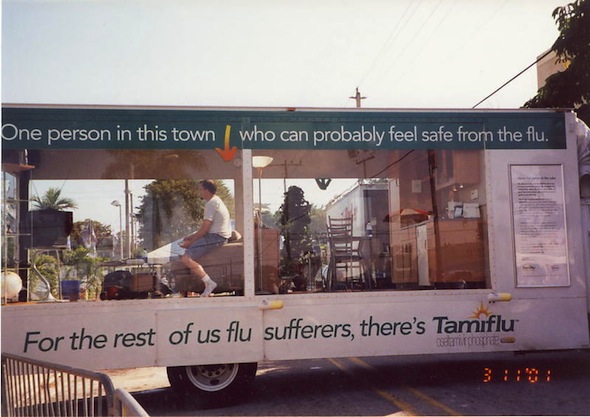The research used to gain approval for the drug Tamiflu (oseltamivir), commonly used to prevent flu complications, is being questioned for its reliability. The editor-in-chief of the British Medical Journal (BMJ), Fiona Godlee, MD recently published an online letter to a Roche board member reminding him of concerns about the research since 2009.
This is just another example of a drug that is marketed to the unsuspecting public that, at best, turns out to be completely unnecessary and at worst, may have significant adverse effects which have not been disclosed.
Raw Data Never Released for Inspection
Apparently, eight of the ten studies on which effectiveness claims were based were never published and the two that were published were funded by Roche and authored by Roche employees and Roche paid external experts.
It is common for drug companies to fund the research they are submitting for review. Clearly data collected in this way can not be relied upon to show any negative or adverse outcomes.
Roche Made Public Assurances the Data Would be Made Available
Roche promised the Cochrane collaboration that the data on the ten trials would be made to physicians and scientists. However, the full study reports were never made available.
Dr. Godlee writes:
The Cochrane reviewers now know that there are at least 123 trials of Tamiflu and that the majority (60%) of patient data from Roche Phase 3 completed treatment trials remain unpublished. There are concerns on a number of fronts: the likely overstating of effectiveness and the apparent under-reporting of potentially serious adverse effects. Meanwhile, Tamiflu has just been added to the list of essential drugs alongside aspirin and beta blockers.
In a media statement responding to the allegations, Roche denies withholding clinical information.
Japanese Doctor Keiji Hayashi, MD Opened This Can of Worms for Roche
Japanese pediatrician, Keiji Hayashi, MD, pointed out that the previous Cochrane review, which had found that oseltamivir was effective in reducing pneumonia and other important complications of influenza, was based on a single peer-reviewed study by Kaiser and colleagues.
It turns out that the Kaiser study, which was a meta-analysis of 10 manufacturer-funded trials, included just 2 studies that were published in peer-reviewed journals. When the Cochrane reviewers tried to verify the data from the 8 unpublished trials, they found inconsistencies in the evidence for oseltamivir’s effectiveness and safety.
The most important finding is that Roche funded the Kaiser meta-analysis.
FDA Safety Reporting Called Into Question
US Food and Drug Administration’s safety reporting rules are called into question. Manufacturers must report adverse events, but only if they occur in the United States. According to Mr. Doshi, a PhD student at MIT and a coauthor of the updated Cochrane review who has investigated this issue writes,
In the case of oseltamivir, considering that 75% of global consumption has occurred in Japan, this has important implications for our knowledge of its safety.
Fiona Godlee, MD, Editor-in-Chief of BMJ, and Mike Clarke, MD, Director of the UK Cochrane Centre both say,
the updated review is important because it calls into question not only the effectiveness of oseltamivir but the whole system by which drugs are evaluated, regulated and promoted.
Nick Freemantle, PhD, and Melanie Calvert, MD, from the University of Birmingham, United Kingdom, reviewed the observational studies provided to the Cochrane reviewers by Roche. They said that in general,
the studies support the conclusion that oseltamivir may reduce the incidence of complications of influenza in otherwise healthy adults, but as such events are rare, treatment with oseltamivir for most people is not likely to be clinically important.
Does Any of This Surprise You?
Sadly, the American public relies upon the FDA to oversee the powerful drug companies. However, we know that they are in bed with each other on many issues such as, GMOs, vaccines, pharmaceuticals, and research.
The most telling comment was Dr. Godlee’s suggestion that this incident calls into question “the whole system by which drugs are evaluated, regulated and promoted.”
Amen.
What Does Tamiflu Actually Do?
Tamiflu (oseltamivir phosphate) is approved for treatment of uncomplicated influenza A and B in children one year of age or older. It is also approved for prevention of influenza for those 13 years or older. It is a neuraminidase inhibitor, which works by blocking a viral enzyme so that the virus cannot invade cells in the respiratory tract.
It may reduce the duration of flu symptoms by about a day to a day and a half if taken within 48 hours of onset of illness. It costs about $100 or more.
Not very impressive.
What they don’t tell you is that some patients with influenza are at increased risk for secondary bacterial infections when on Tamiflu. Other adverse events that have been reported include pediatric deaths, serious skin reactions, and neuropsychiatric events, including suicide committed while delirious.
Would you take this drug, or give it to a loved one, to decrease only 1.5 days of the flu if it put you at risk for a psychiatric event or even suicide?
What Can You Do To Protect Your Health?
Do exactly the opposite of current health and diet recommendations. Eat lots of fat and less or no grains — or only properly prepared grains. Eat plenty of eggs, butter and meat from grassfed animals, use lots of sea salt and go out of your way to eat cholesterol.
Eat real food.
Avoid the rancid vegetable oils that they say are healthy, avoid packaged and chemical laden food substitutes and avoid medical and dental procedures as much as you can.
Be your own health advocate and stand up for common sense. In this way you will protect your health.
Check out my next post on what to do when and if you ever contract the flu.











